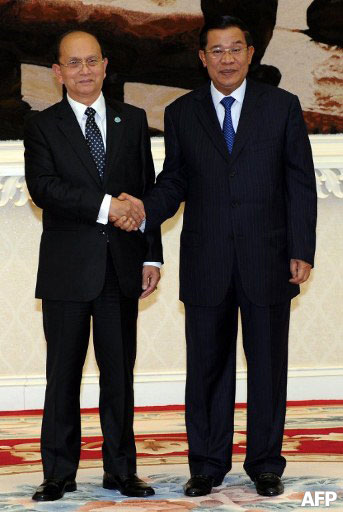Burmese President Thein Sein arrived in Phnom Penh on Wednesday, where he is scheduled to meet with Cambodian King Norodom Sihamoni and Prime Minister Hun Sen.
 He confirmed that Burma has invited a delegation of Asian and Western monitors to observe the April 1 by-election, according to an article by The Associated Press on Wednesday. Thein Sein will travel to Laos on Thursday.
He confirmed that Burma has invited a delegation of Asian and Western monitors to observe the April 1 by-election, according to an article by The Associated Press on Wednesday. Thein Sein will travel to Laos on Thursday.
Each of the 10-member countries of the Association of Southeast Asian Nations (Asean) will send two official delegates to watch the April 1 by-elections, according to Cambodian government spokesman Khieu Kanharith.
Khieu Kanharith said Thein Sein told Cambodian Prime Minister Hun Sen that Asean “dialogue partners” — Australia, Canada, China, the European Union, India, Japan, New Zealand, South Korea, Russia and the United States — would also each be invited to send a small delegation.
Thein Sein asked Hun Sen for information on Cambodia’s experiences with foreign election observers and the Cambodian leader agreed he would send relevant documents on the subject, according to the AP.
In Washington, the U.S. State Department spokeswoman Victoria Nuland said the U.S. had been invited to send two representatives and three journalists and it would coordinate with Asean and other observers to maximize the impact their monitoring could have.
“This is a good first step,” Nuland told a news briefing. “Burma has not allowed international observation before, but it does fall short of complete transparency on an election, and we hope they will continue to keep the system open and open it further.”
Forty-eight seats are up for grabs in the by-election, only Burma’s second election in two decades. Suu Kyi, a former political prisoner, has said the government is in danger of having the by-election campaign process judged as not free and fair. She has cited numerous incidents of campaign abuses and efforts to stymie her campaign activities.
Western countries are relying on Suu Kyi's judgment as to whether the election is free and fair, a fundamental condition in the lifting of sanctions against Burma.
In Washington, Aung Din of the pro-democracy group U.S. Campaign for Burma expressed election doubts, citing irregularities including fraudulent voter lists, vote buying and bias among branches of the election commission.
Aung Din said, “I don't know how international observers can catch this fraud when they arrive in Burma two or three days before the election day.”


